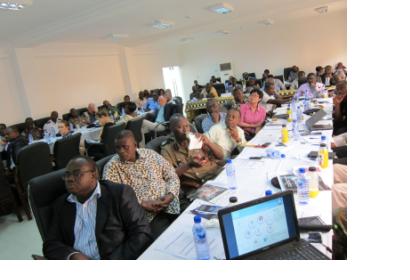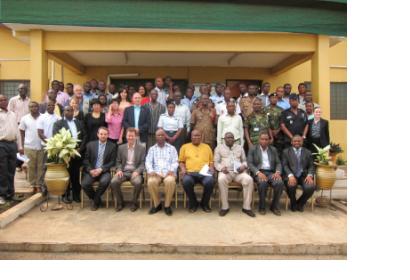From 25 to 29 November 2013, UN-SPIDER carried out a five-day Technical Advisory Mission to Ghana in order to assess the current state and the potential of using space-based information for disaster risk management and emergency response in the country. The Mission was conducted upon the invitation of the Government of Ghana through the National Disaster Management Organisation (NADMO).
The mission team comprised ten experts from various institutions including UNOOSA, United Nations University (UNU), United Nations Environmental Programme (UNEP), National Space Research and Development Agency (NASDRA), MetOffice UK, National Disaster Risk Reduction of China (NDRCC), Secure World Foundation and the University of Free State.
The mission was conducted through visits to different national and international institutions and organisations involved in disaster risk management, emergency response and the use of satellite data. These included various governmental departments and ministries such as the Ministry of Food and Agriculture, Centre for Remote Sensing and Geographic Information Services , Town and Country Planning Department, The Forestry Commission, Ghana Meteorological Agency, Ghana Atomic Energy Commission (Ghana Space Science & Technology Institute), Hydrological Services Department, Ghana National Fire and Rescue Service, Geological Survey Department, Environmental Protection Agency and the Ghana Statistical Service.
The mission team additionally met with experts from UNDP and the Department of Geography and Resource Development of the University of Ghana.Additionally, UN-SPIDER organised a national workshop on 28 November. More than 40 stakeholders from academia, ministries, emergency services and international organisations were introduced to applications of remote sensing for disaster risk management including flood mapping. They were also informed about existing international mechanisms such as the International Charter "Space and Major Disasters" that make available satellite information for support emergency response as well as on NADMO's role in the coordination of disaster management in Ghana. Various group discussions allowed participants to exchange on the current and potential use of space-based technology and the role for disaster management in each organisation.
The mission was wrapped up with a debriefing of NADMO staff and its national coordinator presenting main observations and recommendations made by the mission team.


